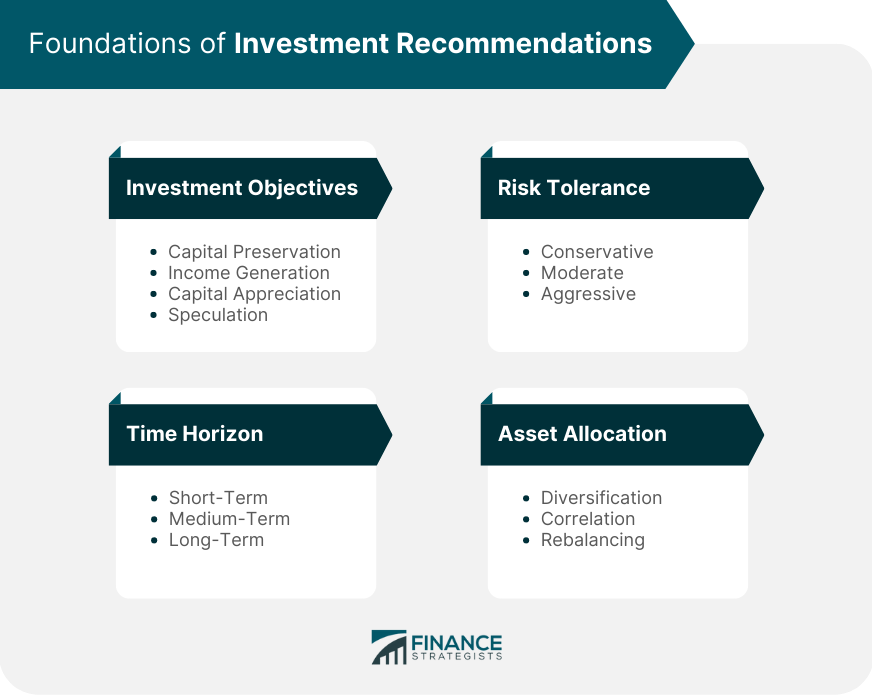Investment recommendations are professional advice or suggestions provided by financial experts, analysts, or investment firms to help investors make informed decisions about their investments. These recommendations are typically based on in-depth research and analysis of various factors, such as a company's financial health, industry trends, macroeconomic conditions, and market sentiment. The primary purpose of investment recommendations is to guide investors in selecting the most suitable investment options that align with their financial goals, risk tolerance, and time horizon. By following well-researched and personalized investment recommendations, investors can optimize their financial outcomes and achieve their investment objectives. Investment recommendations can have a significant impact on the decisions investors make. When investment experts recommend a particular stock or asset, it can influence investor sentiment and trigger buying or selling activity. This can result in a surge or decline in the value of the asset, affecting not only the investors who follow the recommendation but also the overall market. However, investment recommendations should be taken with a grain of salt, as they are based on the analyst's subjective assessment and market conditions at a particular time. Investors must also consider their financial goals, risk tolerance, and investment horizon before acting on a recommendation. Blindly following investment recommendations can lead to poor investment decisions and negative consequences for an investor's portfolio. The primary goal of capital preservation is to maintain the investor's initial capital without losing its value over time. This objective is typically suited for conservative investors seeking minimal risk. Income generation focuses on producing a steady stream of income through dividends, interest payments, or rental income. Investors with this objective typically aim for a balance between risk and return. The goal of capital appreciation is to increase the value of the investment over time. This objective is best suited for investors with higher risk tolerance and a longer time horizon. Speculative investors aim to achieve high returns through high-risk investments, such as penny stocks, options trading, or cryptocurrencies. This objective is generally only recommended for some investors due to the substantial risk involved. Conservative investors prioritize capital preservation and income generation over capital appreciation. They typically invest in lower-risk assets, such as government bonds and dividend-paying stocks. Moderate investors seek a balance between capital preservation and capital appreciation. They typically invest in a mix of lower-risk and higher-risk assets to achieve a well-diversified portfolio. Aggressive investors prioritize capital appreciation and are willing to take on more risk to achieve higher returns. They often invest in growth stocks, emerging markets, or alternative investments. Short-term investors generally have a time horizon of less than three years. They often invest in liquid assets, such as money market funds or short-term bonds, to minimize the impact of market fluctuations. Medium-term investors typically have a time horizon of three to ten years. They generally invest in a mix of stocks and bonds to achieve a balance between growth and income. Long-term investors have a time horizon of more than ten years. They often focus on capital appreciation and invest in diverse assets, including stocks, bonds, and alternative investments. Diversification involves spreading investments across various asset classes, sectors, and geographic regions to minimize risk and maximize potential returns. Correlation is a measure of how different assets perform relative to one another. Investors should consider the correlation between assets when constructing a diversified portfolio. Rebalancing is the process of periodically adjusting the weightings of assets in a portfolio to maintain the desired risk level and investment objectives. Title: Foundations of Investment Recommendations Research reports are a valuable source of investment recommendations as they offer in-depth analysis and insights from professional analysts and investment firms. These reports provide investors with detailed information on companies, industries, and market trends, along with investment recommendations based on the analyst's research. Investors can use these reports to make informed decisions and to identify potential investment opportunities Financial news sources are another important source of investment recommendations. These sources provide investors with real-time information on market developments, company announcements, and economic events that can affect investment decisions. Financial news outlets also feature expert commentary and analysis on investment trends, offering investors valuable insights and recommendations. Expert opinions from industry professionals such as fund managers, analysts, or financial advisors can provide valuable insights and investment recommendations for investors. These experts have years of experience and are well-versed in market trends, industry developments, and investment opportunities. Investors can use their expertise and recommendations to make informed investment decisions and to build a well-diversified investment portfolio. Investment newsletters are another source of investment recommendations that offer valuable insights, market analysis, and portfolio management advice. These publications provide investors with regular updates on market trends, investment opportunities, and economic events. They often feature expert commentary and investment recommendations from financial professionals, making them a valuable resource for investors looking to stay informed and make sound investment decisions. Fiduciary duty is the legal and ethical obligation of financial advisors and other investment professionals to act in the best interests of their clients when providing investment advice. Investment professionals should disclose any potential conflicts of interest that could influence their investment recommendations, such as personal financial interests or company relationships. Insider trading involves trading securities based on material, non-public information and is illegal. Investors should only rely on publicly available information when making investment decisions. Investment professionals are required to disclose relevant information, such as fees, commissions, and potential risks, to help clients make informed investment decisions. Investment recommendations play a crucial role in helping investors make well-informed decisions to optimize their financial outcomes. By understanding the foundational principles of investing, various investment vehicles, research and analysis methods, portfolio construction techniques, and ethical considerations, investors can make better decisions and achieve their financial goals. Personalized investment recommendations take into account an investor's unique financial goals, risk tolerance, and time horizon. Investors can develop an investment strategy that aligns with their specific needs and objectives by seeking tailored advice. The investment landscape constantly evolves, and investors must stay informed about market developments, new investment opportunities, and emerging trends. By continuously learning and adapting their investment strategies, investors can enhance their financial outcomes and successfully navigate the complex world of investing.What Are Investment Recommendations?
Impact of Investment Recommendations
Foundations of Investment Recommendations
Investment Objectives
Capital Preservation
Income Generation
Capital Appreciation
Speculation
Risk Tolerance
Conservative
Moderate
Aggressive
Time Horizon
Short-Term
Medium-Term
Long-Term
Asset Allocation
Diversification
Correlation
Rebalancing

Sources of Investment Recommendations
Research Reports
Financial News
Expert Opinions
Investment Newsletters

Ethical and Legal Considerations of Investment Recommendations
Fiduciary Duty
Conflict of Interest
Insider Trading
Disclosure Requirements
Conclusion
Investment Recommendations FAQs
Investment recommendations are suggestions or opinions from financial experts on investing money. These recommendations are usually based on the current economic situation, market trends, and an investor's financial goals.
Investment recommendations can come from various sources, such as financial advisors, brokers, portfolio managers, and financial news outlets. Investors should always ensure that the source of the recommendations is credible and reliable before acting on them.
Investors should evaluate investment recommendations by considering factors such as the recommendation's track record, the credibility of the source, and the investor's financial goals. It's essential to understand the risks involved and to ensure that the recommendation aligns with your investment strategy.
No investment is guaranteed to make money; investment recommendations are no exception. It's crucial to understand that investing involves risk, and investors should be prepared to lose money. Investment recommendations are meant to provide guidance and help investors make informed decisions.
No, investors should not rely solely on investment recommendations to make investment decisions. Conducting your research, understanding your investment goals, and evaluating your risk tolerance is essential. Investment recommendations should be used as a tool to supplement your research and help you make informed decisions.
True Tamplin is a published author, public speaker, CEO of UpDigital, and founder of Finance Strategists.
True is a Certified Educator in Personal Finance (CEPF®), author of The Handy Financial Ratios Guide, a member of the Society for Advancing Business Editing and Writing, contributes to his financial education site, Finance Strategists, and has spoken to various financial communities such as the CFA Institute, as well as university students like his Alma mater, Biola University, where he received a bachelor of science in business and data analytics.
To learn more about True, visit his personal website or view his author profiles on Amazon, Nasdaq and Forbes.











